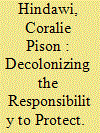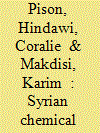|
|
|
Sort Order |
|
|
|
Items / Page
|
|
|
|
|
|
|
| Srl | Item |
| 1 |
ID:
183726


|
|
|
|
|
| Summary/Abstract |
Many postcolonial or critical scholars are rather sceptical of the Responsibility to Protect principle. In most of the critical literature, Responsibility to Protect (R2P) is presented as a product from the West, whose liberal ideal relies on a perception of Southern states being potentially dysfunctional, which in turn justifies an interventionist discourse with neocolonial overtones. The problem with this interpretation of R2P is that it essentially ignores non-Western, particularly Southern, inputs on the concept, falling precisely into the trap that, many authors claim, vitiates Responsibility to Protect: its West-centrism. Building upon a mix of critical, decolonial, postcolonial and Third World Approaches to International Law scholarship, this article proposes a number of additional steps to decolonize R2P in an effort to avoid what Pinar Bilgin describes as ‘conflating the critiques of the particularity of universals with critiques of the idea of having universals’. What successive decolonizing layers expose is a negotiation process in which the agency of states from the global South in shaping the – still controversial – principle has proved particularly obvious. Decolonizing Responsibility to Protect, this article argues, requires critical scholars to engage in a contrapuntal analysis in order to acknowledge the concept’s mutual constitution by the West and the ‘rest’ and the deeper struggles over universals hiding underneath.
|
|
|
|
|
|
|
|
|
|
|
|
|
|
|
|
| 2 |
ID:
153135


|
|
|
|
|
| Summary/Abstract |
This article explores the successful Syrian chemical weapons disarmament process (2013–2014) within the context of post-Cold War coercive arms control policy and scholarship, particularly related to the Middle East. Based on extensive interviews with individuals involved in the process, we explore the coexistence of two rival, apparently contradictory narratives: one (backed by Western states) claimed coercion was the main contributor to disarmament, while the other (defended by Syrian authorities and Russia) insisted on the process’s consensual features. Our study suggests that the hybrid disarmament framework, embodied in a unique joint mission between the United Nations and the Organisation for the Prohibition of Chemical Weapons, conveniently accommodated both narratives, which in turn contributed to the mission’s success. We then ask whether, with the apparent US retreat in the Middle East, the Syrian case (as well as the 2015 Iran nuclear deal) signals a possible turn in international non-conventional arms control processes that would leave more room for consent and diplomacy.
|
|
|
|
|
|
|
|
|
|
|
|
|
|
|
|
|
|
|
|
|